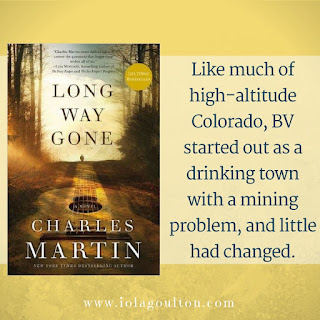Review by Iola Goulton
Well, that’s a great first line—I don’t know who is speaking, but by the end of the first page I know he’s a musician. Who else would describe the worn-out guitar as “an old Gibson J-45”? And then he goes on to say:
The residue of musical genius. That’s strong writing—writing I want to read more of. I’m not going to bore you with all the quotes I highlighted in Long Way Gone, but there were a lot. But I hope you’ll forgive me one more, because it’s a great example of how to get a lot of setting across in one short sentence:
But you’re here to read a book review, not a commentary on the writing.
Long Way Gone is a retelling of the story of the Prodigal Son, set in high-country Colorado and among the ups and downs of the Nashville music industry. It’s written in first person from the point of view of Cooper O’Connor, an evangelist’s son with a gift for music.
The writing is outstanding, the plot is excellent, the structure close to perfect.
I was fascinated by the musical information—the Ryman theatre, the Nashville Notation System, the whole music vibe. Anyone who watches Nashville or who has ever visited (or wants to visit) the home of country music will appreciate that side of it (and will be able to relate to the characters). I was impressed with the way so much research and setting was dropped in without it ever getting in the way of the central story.
I only found one fault with Long Way Gone, the recurrent misuse of an old saying: “if I thought x, I had another thing coming”. No. It’s “another think coming”. Thought, think. Not thing. Ask Goggle. I don’t know if that’s the fault of the author or the editor, but it’s the one thing which took me out of the story. Because writing this good shouldn’t be spoiled by silly mistakes.
The story spans decades.
So while we see Cooper’s mistakes through his eyes, we see them through the eyes of a man who has matured enough to realise they were mistakes—mistakes he’s repented from, even if he’s still not fully reconciled to the consequences of those mistakes.
It’s a story about a man (who loves a woman—yes, there is a romance element), and his love for music. It’s a story of a man who makes mistakes in his pursuit of happiness. And it’s a story about how sometimes those mistakes can be made right again, and sometimes they can’t.
Recommended for music fans, romance fans, or anyone who appreciates good writing.
Thanks to Thomas Nelson and NetGalley for providing a free ebook for review. You can find out more about Charles Martin at his website, and you can read the introduction to Long Way Gone below:



